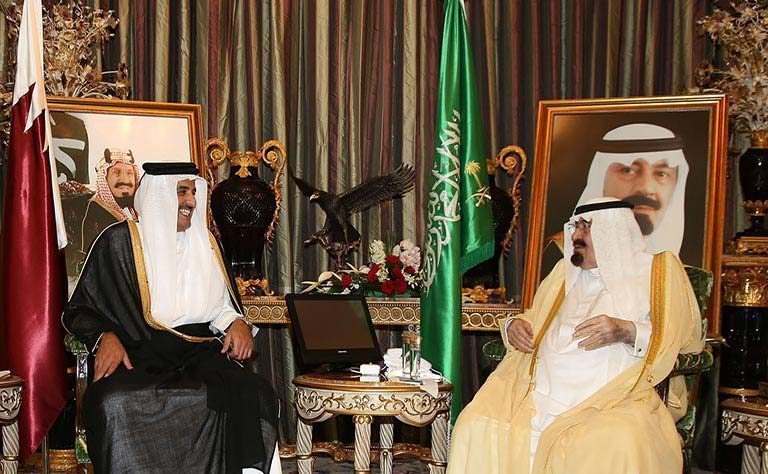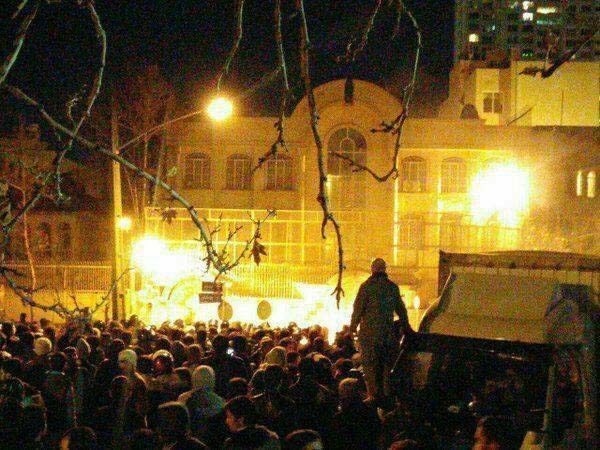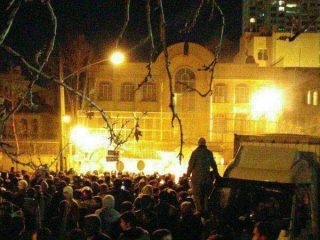Qatar has “strongly condemned and denounced” attacks on the Saudi embassy in the Iranian capital of Tehran and its consulate in Mashhad City, QNA reports.
In a statement, Qatar’s Ministry of Foreign Affairs (MOFA) stressed that the non-peaceful protests, which took place on Sunday, were a clear violation of international conventions and norms.
It also renewed its support for its “sister” country Saudi Arabia and the nation’s efforts to enhance security, stability and counter different threats.
Video shows protesters inside Saudi embassy in Tehran pic.twitter.com/DEmsNLI6ZG
— Sobhan Hassanvand 📰 سبحان حسنوند (@Hassanvand) January 2, 2016
Protests broke out in Iran after Saudi Arabia executed 47 people on terrorism-related charges, including prominent Shia cleric Sheikh Nimr al-Nimr, who was outspoken against the ruling Saudi family and its treatment of Shia residents.

According to the New York Times, demonstrators threw Molotov cocktails at the Saudi Embassy, broke furniture and smashed windows.
The newspaper also quoted Hossein Jaberi-Ansari, a spokesman for Iran’s Foreign Ministry, as criticizing Saudi for Sheikh Nimr’s execution:
“It is clear that this barren and irresponsible policy will have consequences for those endorsing it, and the Saudi government will have to pay for pursuing this policy,” he said.
Protests against the executions were also held in several other countries, including the US, Turkey, Pakistan, Bahrain, Lebanon and Iraq.
For its part, the Saudi Ministry of Interior said that most of those executed were involved in a series of attacks carried by al-Qaeda.
Severed relations
Saudi cut off relations with Iran on Sunday, following the attacks on its embassy and consulate.

Saudi Arabia’s foreign minister, Adel al-Jubeir, said during a press conference that Iran’s diplomatic mission and related entities in Saudi Arabia had been given 48 hours to leave the country.
He added that Riyadh would not allow Iran to undermine the “Sunni kingdom’s security,” the Guardian reports.
In what appeared to be an attempt to calm the situation, the Iranian president, Hassan Rouhani, said the attack on the Saudi embassy was unjustifiable, and urged the capture of the perpetrators.
But he also added, “I have no doubt that the Saudi government has damaged its image, more than before, among the countries in the world, in particular (among) Islamic countries, by this unIslamic act,” according to the Guardian.
‘Nightmare scenario’
According to Michael Stephens, director of the Royal United Services Institute (RUSI) in Qatar, the souring of relations between Saudi and Iran puts Doha in a tricky place, given its “intimate” relationship with the kingdom and its business ties to Tehran.

Speaking to Doha News, he said: “Qatar is in a difficult position, because its relationship to Saudi Arabia is intimate, and its diplomatic allegiance is to the GCC which was primarily set up as a security architecture to deter Iran.”
He continued:
“However Qatar’s critical national interests are intertwined with Iran in the form of the shared North Dome/South Pars gas field, and shared maritime boundaries. As such any escalation in tensions is difficult for the Qataris to manage.
For the smaller Gulf states the nightmare scenario would be to become caught in the crossfire of a conflict between Tehran and Riyadh. Qatar will need to openly support its GCC ally, whilst ensuring that its business relationships with Iran are not permanently harmed. It is a precarious balancing act.”
Thoughts?









